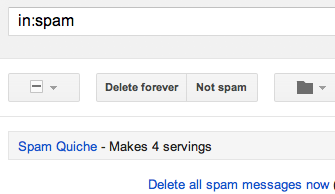I love it when readers of my blog get in touch with me via my contact page. Sometimes I hear from friends looking to reconnect. Other times I get feedback about an article or post I’ve written.
These messages make my day.
Most often, however, the messages I get are spam. Why, yes, I’m absolutely sure I don’t have a long lost relative living in Africa who wants to deposit an inheritance into my bank account.
Sometimes messages might be coming from legitimate businesses, but because the message are worded so poorly, I can’t really tell if they are spam or not. You’ve probably seen these messages: “Buy our product and we guarantee you will quadruple the traffic to your website in less than one week!!!!”, or “I can dezin yur websit reel cheep”. Yup, these also go into the trash.
So, after receiving enough messages from possibly legitimate companies that botch their chances of making a sale, for one reason or another, I thought I’d list five key tips on how to (properly) contact a potential client.
I’m not a marketing guru, but I do get pitched enough that I thought I’d offer some tips to keep me (and probably many other people too) from automatically sending your message into the trash.
Following these tips won’t guarantee you’ll get a sale, but following them shows you are respecting the time of the potential client and helps the potential client more quickly understand whether or not what you are selling will be of interest or benefit.
-
Make it obvious why you are contacting them
I don’t have the time to read a three-page letter from someone I don’t know trying to sell me something they don’t mention until the last paragraph. I understand that this type of ad letter used to work, but these days most people have shorter attention spans. And similarly, after some vague back and forth with someone just starting out in their business, I actually had to ask them what they were selling! Don’t make me ask and don’t make me read your horrible ad copy–tell me up front what you’ve got to offer. </li>
* ### Include some form of “social proof” in your message
Who are you? How can I tell if you are legitimate and/or are not a spammer, hacker, or crook? What is your background? Even including just a link to your website can help me better understand who you are and what you are all about. </li>
* ### Establish some measure of authority
Especially if you are offering a service (web development, SEO, fitness coaching, programming, editing), why should I believe you know anything about what you are offering? Who are some of your past clients or what are some of your past products? Have you written any books or given any seminars on your topic? I need to know why you are the best person I should invest my time and money with. </li>
* ### Give before you ask
Everyone these days is busy and overworked. Rather than immediately asking something of the potential client, whether you are asking for their money or their time, offer something to them of value. Maybe you’ve written a helpful tutorial or book you can give them, or maybe you can provide them useful information that will help them in some way. Or if you are trying to sell a book, let them read the first couple of chapters for free. Giving something helps ensure a positive start to the relationship, and if what you’ve given is truly helpful or of value, you’ve greatly increased the chance that the potential client will return the favor. </li>
* ### Customize your message
You know what the same sales letter sent to multiple people who haven’t given you permission is? Spam. Spam gets filtered out, unopened, trashed. However, if someone who knows me or knows my situation identifies how they can help me, I’ll listen to what they have to say. And because they’ve taken the time to show specifically how their product or service can benefit me, I’ll likely take them up on their offer. </li> </ol>
So hopefully these five tips will help people trying to grow their businesses online have more success when contacting potential clients. Following the above five tips shows the potential client you are respectful of their time, are legitimate in what you are offering, and useful in solving a problem they might have.